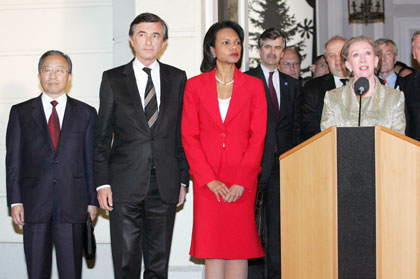Chinese President Hu Jintao on Thursday told U.S. President George W. Bush
that he welcomed the U.S. stance on resolving the Iran nuclear issue through
diplomatic means and its willingness to join negotiations on the issue.
The Chinese government believed the international non-proliferation system
should be maintained and the Iran issue be resolved in a peaceful way through
diplomatic means and talks, Hu said in a telephone conversation with Bush
Thursday night.

British Foreign Secretary Margaret Beckett (R)
addresses the media as Deputy Foreign Minister of China Dai Bingguo (L),
French Foreign Minister Philippe Douste-Blazy (2nd L) and U.S. Secretary
of State Condoleezza Rice (3rd L) watch during a news briefing in the
British residence in Vienna June 1, 2006. Major world powers on Thursday
agreed on a package of incentives for Iran to halt sensitive nuclear fuel
work, as well as penalties if it does not, Beckett told reporters.
[Reuters] |
"China is ready to maintain
contact and coordination with the United States and play a constructive role in
resuming negotiations at an early date," a statement from the Chinese Foreign
Ministry quoted Hu as saying.
Bush told Hu that his country was determined to resolve the Iran nuclear
issue through diplomatic means.
He said as long as Iran agreed to suspend its uranium enrichment activities
in verifiable ways, the United States would join relevant negotiations.
The Iran nuclear issue is reaching a critical stage.
Earlier on Thursday, Iranian Minister of Foreign Affairs Manouchehr Mottaki
told reporters in Teheran that Iran welcomed direct talks with Washington, but
would not give up its nuclear rights.
Senior representatives from the five permanent members of the United Nations
Security Council and Germany were to meet in Viennaon Thursday to discuss the
issue, China's Foreign Ministry said earlier.
Chinese Vice-Foreign Minister Dai Bingguo would attend the meeting, which was
expected to focus on a decision to offer Iran apackage of incentives in return
for suspension of its nuclear activities.
The six nations achieved some progress in forming a common position at a
meeting in London last Wednesday.
Meanwhile, France, Germany and Britain, or the EU-3, have been trying to work
out a package of both incentives and possible penalties to persuade Iran to
suspend its nuclear programs.
Mottaki said in Malaysia on Tuesday that Iran was ready to restart
negotiations with the three European countries.
Hu also told Bush he was ready to work with Bush to advance bilateral
relations in a healthy and stable way.
Hu said during his visit to the United States in April, he and Bush reached
an important consensus on promoting bilateral constructive and cooperative
relations in the 21st Century.
"This is of great significance to the development of relations between China
and the United States," Hu said.
Bush said it was important for both leaders to exchange ideas on strategic
cooperation through such ways as telephone conversations.
Calling Hu's visit to the United States a success, Bush said hewas looking
forward to meeting Hu again to exchange opinions on bilateral ties.
Hu paid his first state visit to the United States from April 18 to 21 this
year. Bush's last visit to Beijing was in November 2005.